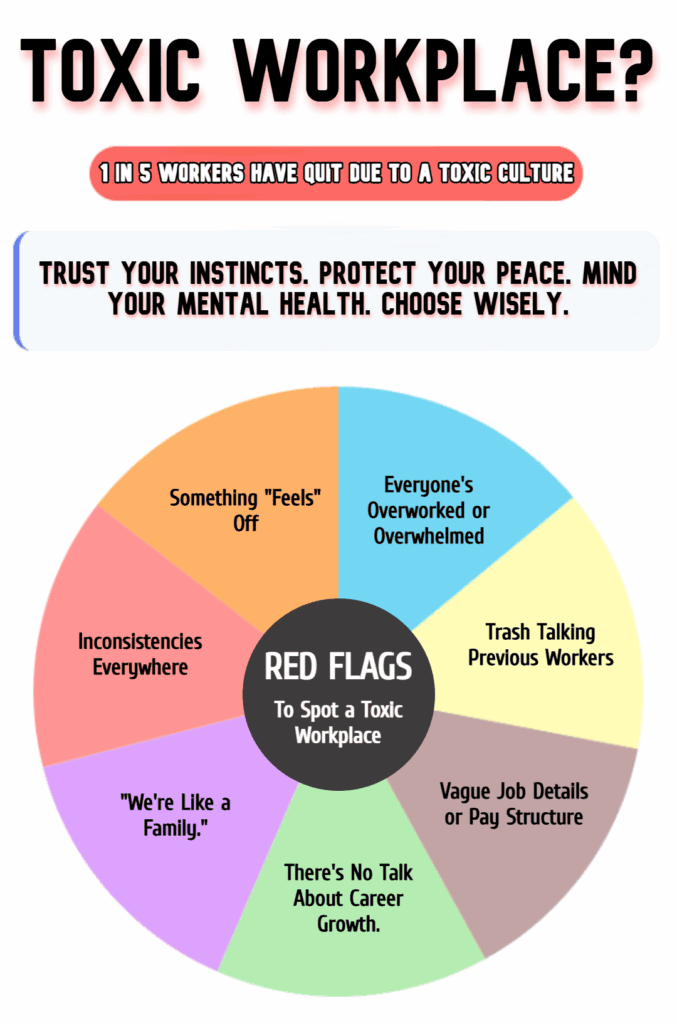That Job Looked Amazing. Until It Didn’t
The pay was great. The title even sounded fancy. The recruiter was super excited to move things along. But three months in? You’re dodging Slack messages, updating your resume, and wondering how it all went sideways, again. The truth is that toxic workplaces very rarely show their red flags up front.
Glassdoor reviews can be managed. Interviews are normally performances. But the red flags? They’re still there, just hiding, for now. According to SHRM, nearly 1 in 5 U.S. workers has quit a job due to a toxic culture. And Google search trends for “toxic workplace signs” jump every time a major layoff or company scandal hits the news.
This guide walks you through seven subtle but reliable warning signs, pulled from real HR insights, recruiter experiences, and jobseeker stories; plus we added a quick-hit checklist you can use before you ever sign on the dotted line.
1. Vibes Over Values: When Something Feels Off
You walk into the interview and feel… weird. The team seems tense. The conversation feels overly scripted. The eye contact is off. You can’t quite name it, but your gut already has an opinion.
That’s not nothing.
Toxic workplaces often look fine on the surface, especially if they’ve been burned on Glassdoor and are in damage control mode. But under the polish, you may catch early signs:
- Team members who seem distracted or disengaged
- An overcompensating hiring manager who “sells” the company a little too hard
- Inconsistent tone across interviews, too formal, then suddenly too casual
One HR director put it this way:
“If the company’s values are clear on the wall, but the energy in the room doesn’t match them, that’s your cue.”
When in doubt, trust the vibe check. You don’t need a reason to pause. If it feels off, ask more questions… or walk away.
2. Everyone’s Overbooked, Overwhelmed, or… Just Not There
You’re halfway through the interview process, and something’s missing, like actual people. Maybe you’ve only met one person (who rescheduled twice). Or the manager looks frazzled, glances at the clock constantly, and apologizes for not prepping.
You might hear things like:
- “Sorry, we’re all slammed this week.”
- “I was up late finishing a proposal.”
- “We’re still trying to figure out who will be managing this role.”
None of these alone are immediate deal-breakers; but when stacked together, they point to a toxic culture that’s running on fumes.
Bonus red flag: When you ask about work-life balance and they respond with a joke, or a sigh.
In toxic environments, stress is normalized. Burnout is worn like a badge. And if people are too exhausted to properly interview you, they’re probably going to be too exhausted to support you once you’re hired.
3. They Trash Former Employees (or Your Predecessor)
You ask why the role is open, and the answer feels… personal.
- “The last person just couldn’t handle the pressure.”
- “They weren’t really a team player.”
- “Honestly, you already seem like a better fit than they ever were.”
Yikes!
When a company talks down about former employees, especially when they use their name, it’s way more than just unprofessional. It’s revealing. You shouldn’t be worried about being “trash-talked” if your interview doesn’t go well, or you eventually turn down the job. How someone who isn’t there and can’t defend themselves is mentioned or discussed in an interview tells you exactly how they’ll talk about you too.
Even vague jabs like “we’ve had a bit of turnover in that department” can imply an even deeper dysfunction, like lack of support, poor management, or unclear expectations.
As a recruiter friend of mine said:
“If they casually badmouth someone that quit or that they fired, seriously ask yourself what story they’ll tell about you, if things don’t work out.”
Great teams don’t wave this red flag. They explain their systems, the challenges, and any changes with direct transparency, not gossip.
4. The Pay or Job Details Are Vague or Keep Shifting
You ask about salary. They say, “That’s still being finalized.”
Try to clarify the job scope. They say, “We’re looking for someone flexible.”
You ask who you’ll report to. They say, “That’s TBD right now.”
Welcome to the murky waters of job offer ambiguity, a common red flag for chaos, under-resourcing, or flat-out bait-and-switch behavior.
Even startups with fluid org charts should be able to answer the basics:
- What is the range for this role?
- What are the primary responsibilities?
- Who decides what success looks like?
One hiring consultant said it best:
“The more senior the role, the clearer the offer should be, not more vague.”
If they can’t tell you what you’re being hired to do, or how much they’ll pay you to do it, that’s not flexibility. That’s classic toxic workplace dysfunction.
5. No One Talks About Growth, Only Workload
You ask about continuous training. They talk about deadlines.
Maybe you bring up mentorship. They pivot to backlogs.
You ask where the team is headed. They say, “We’re just trying to stay afloat.”
You don’t find toxic workplaces thinking about the long-term, because they’re just too busy keeping up with putting out dumpster-fires. So when career growth, personal development or career progression never come up, even when you ask, it’s a very telling sign of toxicity.
Healthy teams can answer questions like:
- How do people grow here?
- Is there budget for upskilling or conferences?
- What does success look like after 6 months?
If you’re only hearing about hustle, hustle, hustle, and none of the “what’s next”, they’re not hiring you to thrive. They’re just hiring you to cope.
Quick test: Ask, “What happened to the last person who was promoted from this role?”
If the answer is awkward silence, you’ve already learned a lot.
6. You Hear “We’re Like a Family”
We have all heard the classic line:
“We’re like a family here.” (But they just mean toxically dysfunctional)
Spoiler Alert! That usually means guilt trips, blurred boundaries, and required 10p.m. Slack messages.
In a healthy workplace, “family” means support, trust, and collaboration. In a toxic one, it usually looks more like:
- Being expected to sacrifice without complaint
- Loyalty is expected, and a one-way street
- Emotional manipulation replaces professional structure
Watch for companion phrases like:
- “We wear a lot of hats around here.”
- “It’s not so much a 9-to-5, as it’s more of a lifestyle.”
- “We all pitch in, no matter the role.”
As a burned-out manager says:
“If they call it a family in the interview, it’s probably a cult by Q2.”
You owe yourself a workplace where boundaries are clear, and respected. You don’t owe a toxic workplace your identity.
7. You Find Inconsistencies
- The job post says: “flexible hours.”
The hiring manager says: “We expect people online by 8a.m. sharp.”
- Glassdoor mentions recent layoffs… But your interviewer says they are in “growth mode.”
- The recruiter promises a hybrid schedule, but the team lead hints at more full-time in-office, non-option.
Again, as mentioned above in ‘toxic-trait-two,’ alone these little mismatches might be harmless. What about when you group them all together? That waving red flag points to misalignment, miscommunication, or even misdirection.
Reality check:
“If different people give you different answers to the same question, someone’s either uninformed or not being honest.”
You deserve clarity. If they can’t agree on what they’re hiring you for, or where and how you’ll work, it’s not your job to sort that out for them on the job.

Red Flag Radar: Pre-Offer Checklist
Use this 5-3-1 quick-hit guide to gut-check a potential employer before you say yes. Print it, screenshot it, or bring it to your next interview prep.
5- Interview Questions That Reveal a Lot
- “How would you describe the company’s leadership style?”
- “What’s one thing you’d change about the team if you could?”
- “What happens when someone makes a mistake here?”
- “How does this company support growth and development?”
- “Why did the last person in this role leave?”
3- Body Language or Behavioral Cues
- Interviewers seem distracted, rushed, or avoid eye contact
- Jokes or sarcasm used to dodge serious questions (especially about work-life balance or the actual workload)
- Over-selling the company or pressuring quick decisions
1- Follow-Up Email to Clarify Sketchy Answers
Hi [Name],
Thanks again for the interview. I had a quick follow-up on a detail I’d love to clarify: [Insert topic e.g., reporting structure, flexibility, or growth path]. I want to make sure I fully understand how things work on your team before moving forward.
Looking forward to hearing from you.
Best,
[Your Name]
This checklist is simply about pattern recognition. The goal isn’t to avoid every imperfect workplace, otherwise you may be searching forever. Just try to spot the ones that will drain you before you even get through the onboarding process.
Toxic Workplace FAQs
“Can a great salary make a toxic job worth it?”
Sometimes…. But for a very short window. Toxic cultures don’t just drain your time. They drain your health, your confidence, and your future references.
A high paycheck in a bad environment is often just hazard pay with better branding.
“Is it OK to turn down an offer after noticing red flags?”
Absolutely. You owe no one an explanation for protecting your peace.
If you want to stay graceful, say:
“After careful thought, I don’t think this is the right fit for me long-term.”
That’s it. That way you’re not ghosting them, you’re safeguarding yourself.
“What’s one question that always reveals the culture?”
Ask this: “Can you tell me about someone who really thrived here, and what made them successful?”
If they light up with specifics, that’s a good sign. If they stall, joke, or default to “someone who worked a ton,” you’ll learn what they actually value.
“What if I didn’t notice the red flags until after I started?”
It happens, especially when you need a job fast. If you’re already inside and noticing toxic dynamics, document what you see, find allies, and quietly begin an exit strategy if things don’t improve.
You didn’t “fail” by missing the signs. They failed by hiding behind them.
“Can toxic jobs be fixed from the inside?”
Sometimes. But usually not by just one person. If leadership is open to feedback, and you’re seeing positive movement (like new HR policies, diverse staffing jobs or leadership changes), it might be worth staying.
But if you’re being gaslit, overworked, or punished for speaking up? That’s just not fixable. That should be a glowing EXIT sign.




